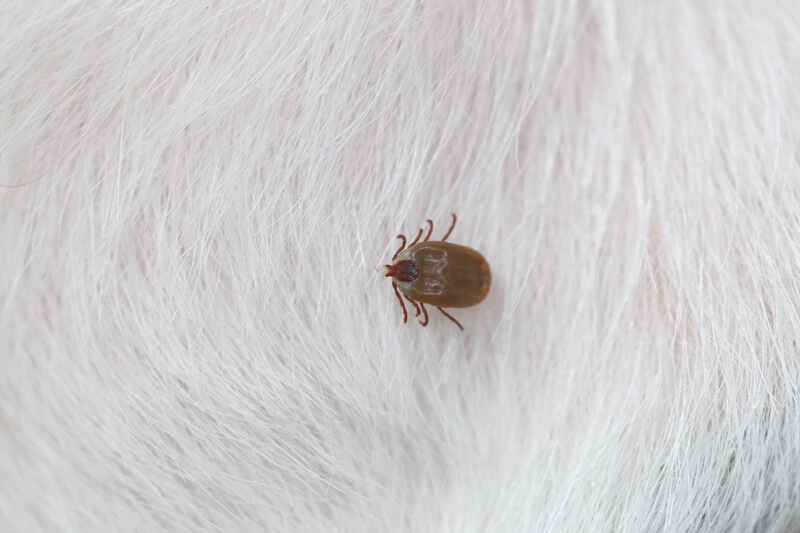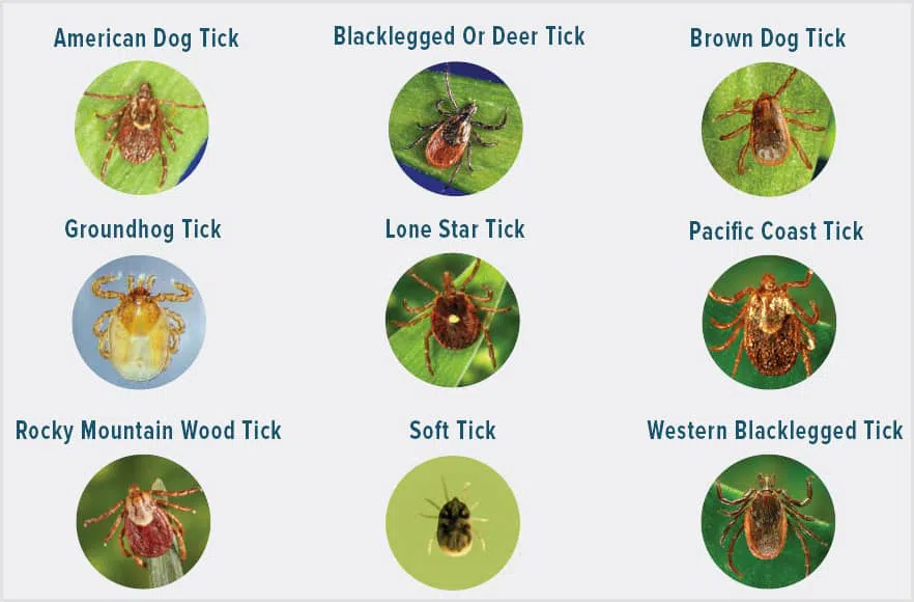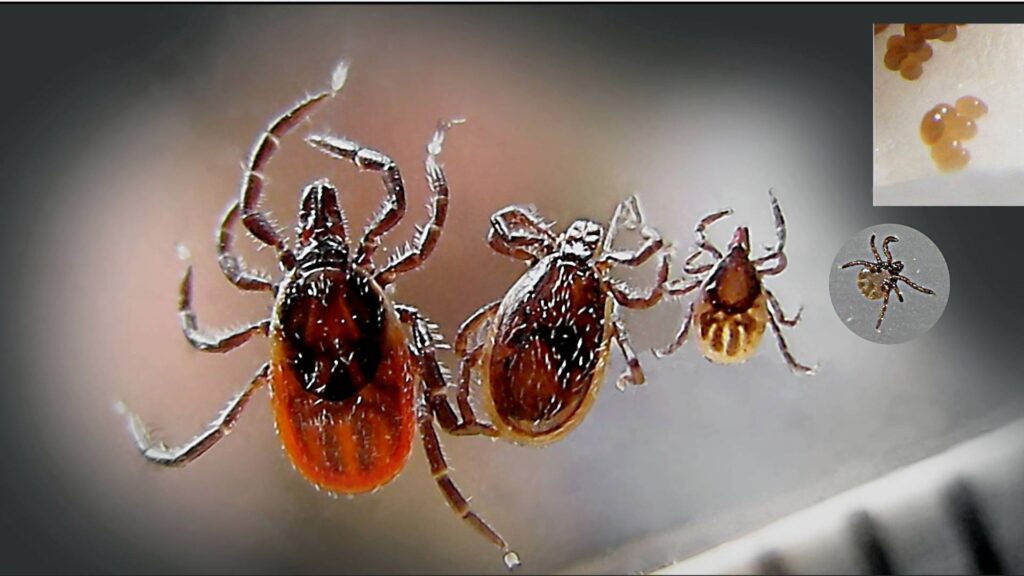Tick Treatments in Florida
Exterminator Services for Tampa, Lutz, Land O Lakes, Brandon, Wesley Chapel, Zephyrhills, Valrico, Riverview
Florida’s warm climate allows ticks to stay active for most of the year, seeking blood meals from pets, wildlife, or people. In places around Tampa such as Lutz, Land O Lakes, Brandon, Wesley Chapel, Zephyrhills, Valrico, or Riverview, ticks may hide in yards where grass remains tall or in shady, damp corners. Once they attach to a pet or person, they can ride indoors and begin laying eggs, potentially leading to an expanding indoor population. Below, you will learn why ticks thrive in Florida, signs of a tick problem, and why professional tick treatments in Florida with an experienced exterminator can solve these issues. You will also see tips on preventing ticks from coming back after you remove them.
Why Ticks Spread Easily in Florida
- Warm Temperatures
Florida rarely sees the icy winters that can temporarily reduce tick numbers in northern states. Ticks remain in search of hosts for many months, feeding and breeding without long dormant periods. - Humidity
Ticks rely on moisture to keep from drying out. Grass that stays damp or corners of yards shaded by trees become tick friendly spots. If these areas are not maintained, ticks can find stable breeding sites. - Multiple Animal Hosts
From cats and dogs to wild creatures like possums or raccoons, ticks have many potential feeding opportunities. Pets that spend time in grassy or wooded environments often return carrying ticks that fall off indoors. - Movement of People and Goods
Florida’s tourism and shipping may spread ticks in luggage, boxes, or personal items. A few unnoticed ticks can establish a new infestation if conditions allow them to feed and reproduce.

Clues You May Have a Tick Infestation
- Pet Scratching or Restlessness
Dogs or cats might bite, lick, or scratch excessively around the ears, belly, or between toes if ticks attach there. Some pets develop raw patches or become nervous from constant itching. - Bites on Humans
Ticks often bite around ankles or knees, leaving small red marks or welts. If you notice bites after spending time in your yard, ticks may be waiting in tall grass or shady nooks. - Visible Ticks Indoors
In larger infestations, ticks might crawl on floors, pet bedding, or furniture. Though they do not jump like fleas, they can climb short distances onto passing people or animals. - Pet Health Changes
Heavy tick feeding can lead to anemia in smaller animals. Certain ticks carry bacteria that cause more serious illnesses in pets or humans, so removing ticks promptly is critical. - Unexplained Pet Anemia or Weakness
If a pet becomes lethargic or weak, check for hidden ticks, especially on puppies or kittens.
Why Ticks Create Problems
- Possible Disease Spread
Some ticks transmit pathogens that may infect people or animals. Even without passing disease, their bites cause itching and can lead to infections if scratched open. - Discomfort for Pets
Repeated tick bites damage a pet’s skin or lead to hair loss in spots. A pet constantly biting or scratching cannot rest properly, affecting overall well being. - Quick Reproduction
Females can lay many eggs after feeding. If they drop off indoors, those eggs hatch into larvae that later grow into biting adults. This cycle repeats without thorough removal.
Business or Community Image
In grooming facilities or other pet related businesses, visible ticks repel customers and raise health concerns. Clean and pest free facilities protect reputation and earnings.

Why You Need a Tick Exterminator
Consumer sprays may kill some adult ticks but often leave eggs or nymphs hidden in carpet fibers or yard debris. Because ticks progress through several stages, each requiring different methods, professional knowledge is vital. An exterminator inspects your property for spots where ticks gather, then applies insect growth regulators and residual sprays that eliminate all stages. They also teach owners how to limit tick breeding, such as drying moist areas and grooming pets regularly. This coordinated effort outperforms partial do it yourself steps that allow ticks to reemerge.
Our Tick Treatments in Florida
- Inspection and Assessment
We begin by checking pet bedding, carpets, or sofa cushions indoors for signs of ticks or eggs. Outside, we look for tall grass, leaf piles, or shady yard corners. Identifying hotspots lets us apply focused solutions. - Targeted Methods
After vacuuming up active fleas or ticks, we use insect growth regulators or residual sprays that kill adult ticks and disrupt eggs or larvae. We concentrate on baseboards, pet zones, or yard edges where ticks hide. - Safety Emphasis
We usually ask occupants and pets to avoid treated spots until products dry. We minimize broad chemical use, focusing on cracks and corners. This precision helps kill ticks while leaving the main living spaces safe. - Follow Up
Tick eggs can hatch days or weeks later, releasing new adults that feed again. A return visit or occupant vigilance confirms these late hatches also meet lethal conditions. We encourage occupants to continue vacuuming or washing pet bedding in hot water weekly.
Why Tampa Sees Ticks
Tampa’s mix of urban, suburban, and coastal climates allows ticks to linger in lawns or at the edges of parks. Pets picking up ticks from play sessions might drop them on carpets at home. Our first step in Tampa is checking floors and corners for any sign of ticks, then treating them thoroughly, including insect growth regulators. We also advise owners to reduce yard dampness or tall grass. This combination denies ticks new places to nest, preventing their return.
Lutz, Land O Lakes, Brandon, Wesley Chapel, Zephyrhills, Valrico, Riverview
In these towns around Tampa, Florida’s moderate climate continues to favor year round tick presence. Ticks may ride on wildlife crossing neighborhoods, eventually reaching yards or pet areas. Our process begins by pinpointing tick clusters indoors and out, applying solutions that tackle adult ticks along with eggs or nymphs. If pets frequently roam, occupant steps like combing animals or storing pet bedding away from floors help break the tick cycle. A consistent approach that includes occupant housekeeping keeps newly hatched ticks from restarting the infestation.

How to Deter Ticks Long Term
- Groom Pets Often
Use a flea and tick comb after walks. A vet might suggest monthly tick control solutions, helping reduce the number of ticks animals bring inside. - Wash Pet Bedding in Hot Cycles
At least weekly, run bedding through hot water and high heat drying. Eggs or larvae cannot survive these temperatures. - Vacuum and Mop Floors
Ticks or eggs fall off onto carpets or cracks. Vacuum floors often, discarding contents outside. Quick disposal stops them from escaping. - Yard Maintenance
Mow grass, trim shrubs, and remove leaf piles. Ticks prefer moist, shaded corners. Limiting these spots forces ticks to move elsewhere. - Limit Wildlife
Secure trash bins and do not leave pet food outdoors at night. Fewer visits from possums or raccoons means fewer opportunities for ticks to drop off in the yard.
Contact Us for Thorough Tick Control
If you notice ticks crawling on floors, see bites on ankles or pets constantly scratching, do not wait to address it. Contact us to learn more or schedule your service. Our tick treatments in Florida feature a close inspection of the indoor environment plus yard hotspots, applying insect growth regulators or residual sprays that kill adult ticks and block new eggs from developing. Residents of Tampa, Lutz, Land O Lakes, Brandon, Wesley Chapel, Zephyrhills, Valrico, or Riverview can trust our methods to restore comfort, safeguarding both pets and people from tick bites and potential diseases.
Preserving a Tick Free Property
Though Florida’s weather supports tick activity across many months, combining occupant tasks with a professional tick exterminator plan cuts off their life cycle. By grooming pets regularly, clearing yards, and vacuuming floors, you lower the odds of another infestation. If ticks do appear, a quick response kills adults and halts egg development. Once your property is cleared, upholding these steps and scheduling periodic checks help ensure a living space free from ticks so you can enjoy Florida’s sunshine without worry about hidden parasites lurking underfoot.
